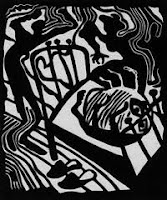C.S. Lewis and Franz Kafka pick up the thread that I wrote about yesterday – the 500 bottles of wine. The title of Kafka’s Metamorphosis is probably his greatest literary device. Gregor, a young man living in an apartment he provides for his sister and his aging parents, turns into a cockroach. The reader is led to assume that the metamorphosis is just that, and our inner eye sees the story from his perspective. It is only when he dies that we realize that it is that characters in the background, his parents and his sister, who have been changing. In his atrophy, they have been slowly emerging from the large shadow that he had cast over them in his providing for them a place to live. It is only at the end that we realize that in his love they had been consumed, had been made small by his largesse.
Like Kafka’s main character, Lewis' Orual casts a large shadow, which in her noble thoughts she imagines to be perfectly loving. Lewis’s Till We Have Faces is based on the story of Cupid and Psyche, which, not coincidentally, is from a Latin work entitled Metamorphoses. The central character, beautiful Psyche’s homely sister, rises to the throne and uses it to bring order and security to her people. But as in Metamorphosis, it is toward the end of the story that she discovers (and the reader realizes) that her nobility has blinded her from seeing that she was consuming the very people she most loved.
We are forewarned. Human love can be consuming. Even (or perhaps especially) love we think of as self-sacrificing. How does this pick up the thread of the idea of more wine than we can drink? Largesse consumes the lover as well as the beloved. We overestimate our capacity to love. We run out of wine. God alone is enough. I see Evelyn Coffey’s face smiling at me, saying the words as Theresa of Avila said them. Dios solo basta! See (and enjoy again) an earlier blog entry for this:
Tomorrow: Tooth Fairy, Santa Claus, God

No comments:
Post a Comment
Your comments are helpful, and will be used to improve this blog.